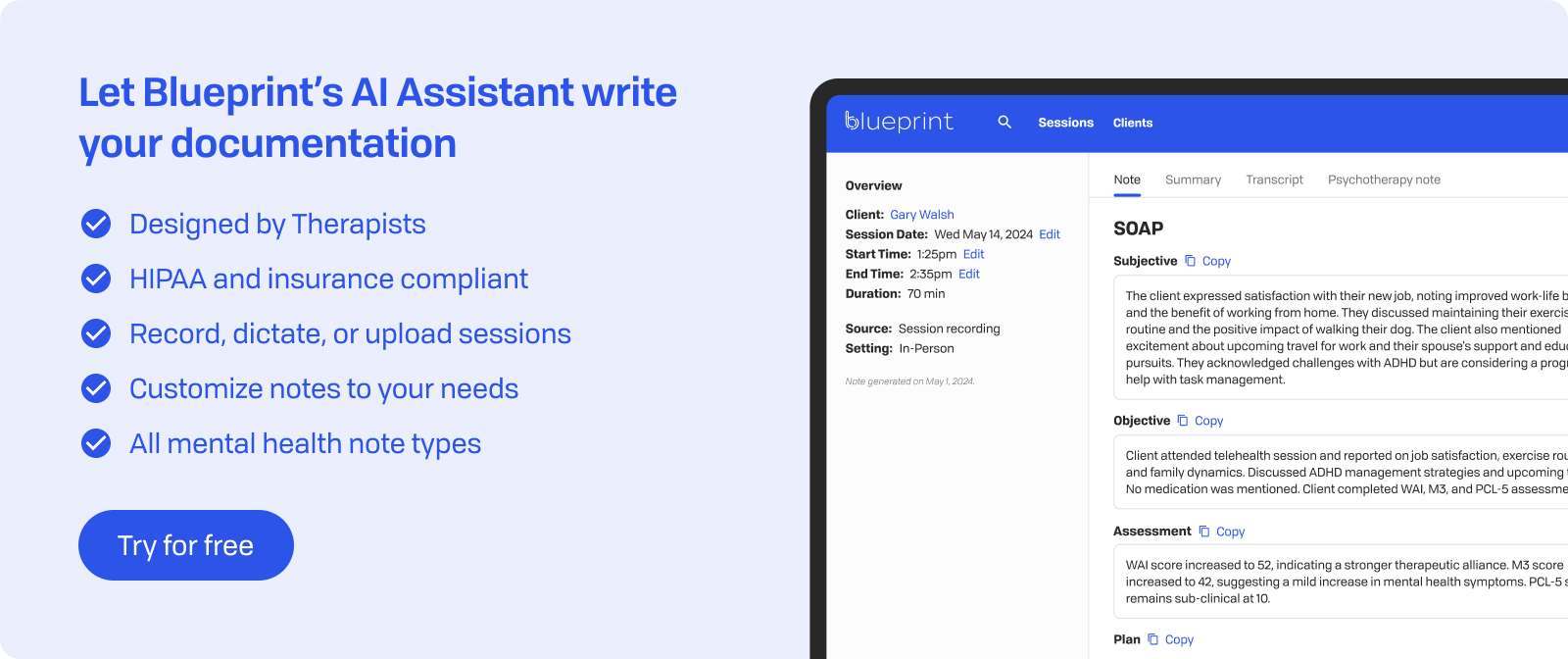
In Brief
The transition from graduate school to clinical practice marks a transformative period in a therapist's career. Those first months of independent practice bring a unique mix of emotions that can feel both overwhelming and exhilarating.
Every seasoned therapist can recall the thrill and fear of sitting across from their first few clients without the support net that grad school provided. Theoretical knowledge feels solid yet somehow insufficient when facing the complexity of real human struggles.
This guide covers the foundations for thriving as a new therapist. We'll look at the emotional landscape of early practice and provide practical strategies for building confidence while maintaining authentic self-care.
Embracing the Start of Practice
Feeling both excited and apprehensive as a new therapist is completely normal. Most practitioners describe their early months as an emotional rollercoaster—feeling confident about a breakthrough one moment, then questioning every intervention choice the next.
This shift from student to clinically responsible practitioner involves more than just a change in title. There is an identity shift that accompanies holding primary responsibility for your case load and holding the therapeutic space and making treatment decisions that impact your clients' well-being. While there is still the opportunity for support in supervision, the case load you now carry may mean that not every case gets discussed.
Imposter syndrome often hits hard during this phase. You might wonder if you're truly qualified or if your clients sense your inexperience. These doubts often intensify after challenging sessions or when progress feels slow.
Self-compassion and supportive supervision serve as your most valuable tools during this transition. Remember that even the most respected therapists once navigated the same uncertainties and self-doubt as you do now.
Professional patience involves accepting that clinical confidence develops gradually through experience. Each session teaches you something new about the therapeutic process, your own style, and the diverse ways clients engage with healing.
Consider keeping a reflection journal for your professional growth. Document observations of your personal processes during clinical interactions, including emotional responses, moments of doubt, and small victories that might otherwise go unnoticed.
The pressure to appear competent can lead new therapists to overcompensate by being overly rigid or trying to have all the answers. Accepting uncertainty and not knowing as a natural part of the therapeutic process actually enhances your authenticity with clients and improves your ability to engage in cultural humility.
Your graduate training provided the foundation, but real expertise emerges through practice. Allow yourself to be a learner even as you guide others. This paradox lies at the heart of effective therapy throughout your career.

Establishing a Solid Therapeutic Identity
Developing your therapeutic orientation as a new therapist involves more than just selecting a modality from a textbook. Your approach should resonate with your personal values, worldview, and the way you naturally connect with others.
Begin exploring different orientations through hands-on experience rather than theory alone. You might find that while you intellectually appreciate psychodynamic concepts, your natural style leans toward solution-focused work. Notice which approaches energize you versus those that drain you during sessions.
Consider these factors when shaping your therapeutic identity:
- Personal values and beliefs: Your authentic self forms the foundation of effective therapy. If you value structure and measurable outcomes, CBT might resonate. If you're attracted to exploring meaning and existence, humanistic or existential approaches may fit better.
- Client population interests: Early specialization helps build confidence and expertise. Whether you're drawn to working with sexual assault survivors, grief counseling, or first responders, focusing your learning accelerates skill development.
- Natural communication style: Some therapists excel at directive, educational approaches while others thrive in exploratory, process-oriented work. Honor your strengths rather than forcing an uncomfortable fit.
Professional goals can change significantly during your first years of practice. What seemed appealing in graduate school might shift after real-world experience. Reflect on your evolving interests at least twice yearly, notice patterns in which clients you most enjoy working with and which interventions feel most natural.
Many new therapists feel pressure to commit to one orientation immediately. Instead, view your early career as a time to explore different methods. Integrative approaches often develop naturally as you find what genuinely helps your clients progress.
Navigating Clinical Decision-Making
Clinical decision-making as a new therapist involves much more than simply selecting interventions from a manual. Your supervisory sessions serve as invaluable learning experiences where theoretical knowledge meets the complex realities of human behavior.
Supervision shifts from being just a requirement to becoming one of your most powerful growth tools when you engage actively. Come prepared with specific questions about case conceptualization, rather than just general updates. Share your clinical reasoning openly, including your uncertainties, to receive focused feedback that enhances your skills.
Effective case conceptualization involves balancing different perspectives:
- Client presentation: Observable behaviors, reported symptoms, and interpersonal patterns
- Theoretical framework: How your chosen orientation explains the client's struggles
- Cultural context: Recognizing how identity, background, and systemic factors influence presentation
- Ethical considerations: Addressing boundaries, dual relationships, and mandatory reporting
Treatment planning gains depth through systematic reflection. After each session, ask yourself specific questions: What interventions worked well? Which moments felt off? How did the client's response differ from what you anticipated?
Develop a personal decision-making framework through structured reflection. Document patterns in your clinical choices—notice when you tend to be more directive versus exploratory, when you feel most confident, and where uncertainty typically arises.
Ethical reasoning improves through practice and consultation. Complex situations rarely have straightforward answers, making peer consultation groups valuable for exploring different viewpoints. Regular case discussions help you internalize ethical principles beyond textbook examples.
Clinical confidence builds gradually. Each decision, whether successful or challenging, contributes to your professional judgment. Trust the process while maintaining a curious and open-minded approach to your ongoing development.

Practicing Self-Care and Setting Boundaries
Self-care isn't just a luxury for new therapists, it's a necessary part of providing quality care and long-term career sustainability. The emotional intensity of clinical work requires deliberate practices to maintain your well-being and prevent the burnout that affects many promising careers in the first few years.
Start with practical session management:
- Schedule buffer time: Build 10-15 minute breaks between clients to reset emotionally and review notes.
- Set daily limits: Cap your sessions at a manageable number, even when building your practice.
- Create end-of-day rituals: Develop routines that help you transition from therapist mode to personal time.
Your boundaries set an example of healthy relationships for clients. Clear communication about availability helps clients understand resources they should access in case of emergency and proactively addresses potential crisis-driven interactions that can drain your emotional resources. Establish response times for emails and calls, explaining these limits during intake sessions. Clients often feel more secure knowing exactly when and how they can reach you.
In addition to attending clinical supervision when you are unlicensed, professional support systems help manage the weight of clinical work.:
- Peer consultation groups: Regular meetings with colleagues normalize challenges and provide fresh perspectives.
- Personal therapy: Addressing your own issues prevents countertransference from affecting sessions.
- Clinical mentorship: Experienced therapists offer guidance through the unique stressors of early practice.
Physical self-care forms the foundation—regular movement, adequate sleep, and proper nutrition directly impact your clinical presence. Consider your self-care practices as seriously as you would any clinical intervention. The therapist who neglects their own well-being inevitably compromises their effectiveness, making self-care a necessary component of ethical practice.

Cultivating Client Engagement and Rapport
Building strong therapy relationships starts with your ability to create a genuine connection from the very first interaction. As a new therapist, you might feel pressure to showcase your knowledge or have the perfect intervention ready, but being authentically present matters more than polished technique.
Listening deeply goes beyond just hearing words, it involves paying full attention to both verbal and nonverbal signals. Notice the client's body language, tone changes, and what remains unsaid. Your focused presence communicates safety and respect more effectively than any specific technique.
Avoid over-planning for sessions. While preparation is important, sticking rigidly to an agenda can hinder genuine connection. Allow the conversation's natural flow to guide you:
- Follow the client's lead: Let them decide the depth and direction of early conversations.
- Create collaborative goals: Work together to establish what success looks like for them.
- Invite ongoing feedback: Ask directly about their experience in therapy and adjust as needed.
Early feedback discussions normalize the collaborative nature of therapy. Simple questions like "How was this session for you?" or "What would you like more or less of?" show that their input shapes the process. This approach reduces the power imbalance often present in therapy relationships.
Cultural humility plays a key role in building rapport. Acknowledge what you don’t know about their background and invite them to share their experiences. This openness allows for genuine understanding rather than relying on assumptions based on limited cultural knowledge.
Remember that rapport grows through consistent small moments of connection rather than grand therapeutic gestures. Your genuine curiosity and willingness to meet clients where they are lay the groundwork for therapeutic change.
Addressing Common Pitfalls and Frustrations
Self-doubt, comparison, and perfectionism affect nearly every new therapist, signaling opportunities for growth rather than professional inadequacy. That nagging voice questioning your qualifications after a challenging session is part of the developmental process, not proof that you don't belong in this field.
Imposter syndrome strikes hard when you compare your beginning to someone else's established practice. Remember that the seasoned therapist you admire once sat where you sit now, questioning every intervention. Their current confidence developed through years of facing the same uncertainties you're experiencing.
Turn these difficult feelings into growth opportunities:
- Track emotional patterns: Notice when self-doubt peaks—after specific client presentations? During particular interventions? This awareness helps pinpoint areas for focused learning.
- Reframe perfectionism: Replace "I should have known what to say" with "I'm learning what works with this client." Or “my humanness is a point of connection with each client.” Growth requires trying new approaches, not flawless execution.
- Document small victories: Client returns for their third session? That's trust building. A breakthrough moment? Evidence of your developing skills. These seemingly minor wins add up to clinical competence.
Your supervisor can help you process these experiences constructively. Share not just clinical content but also your emotional responses—discussing your self-doubt openly normalizes it and allows for targeted support.
Progress in therapy work rarely follows a straight path. Some weeks you'll feel remarkably effective; others will leave you questioning everything. This variability reflects the complex nature of human connection and healing, not your worth as a therapist.

Building Clinical Resilience and Growth
Every client interaction provides valuable insights for your professional growth. Instead of seeing challenging cases as setbacks, view them as opportunities to identify your clinical strengths and areas for improvement. A resistant client can teach you patience, while one who drops out unexpectedly highlights the importance of early engagement strategies and not taking the client’s decisions personally. Knowing when to reframe a tough clinical experience and when to take it as feedback that you could improve something is a skill that will come with time and consultation.
Adopting a learning mindset turns daily practice into ongoing education:
- Targeted workshops: Choose trainings that address your current clinical challenges, not just topics that seem interesting. If anxiety disorders are prevalent in your caseload, prioritize workshops on evidence-based anxiety treatments.
- Peer consultation groups: Regular meetings with fellow therapists help normalize struggles and expand your range of interventions. Listening to how others handle similar cases can broaden your clinical perspective.
- Specialization certificates: Focused training in areas like EMDR, DBT, or couples therapy can enhance your skills and build professional confidence.
Your professional network acts as both a support system and a referral source. Foster relationships with:
- Clinical supervisors: Keep connections beyond required supervision, as these mentors offer guidance throughout your career.
- Specialty providers: Collaborate with psychiatrists, nutritionists, and other specialists for comprehensive client care.
- Peer therapists: Colleagues at similar career stages understand your unique challenges and celebrate your achievements.
Resilience is cultivated through intentional practices like emotion regulation, maintaining work-life boundaries, and seeking therapy when needed. Active coping strategies—such as mindfulness, exercise, or creative pursuits—help replenish the emotional reserves that clinical work can deplete. Remember to care for your own well-being with the same dedication you provide to your clients.
Key Takeaways
Being a new therapist is one of the most challenging yet formative stages of your professional journey. This period requires you to balance vulnerability with competence, uncertainty with expertise, and learning with teaching all while maintaining a genuine therapeutic presence.
The foundations you set now will shape your entire career:
- Early identity formation: Your therapeutic approach develops through real client interactions, not just textbook study. Let your style evolve naturally as you find what truly helps people heal.
- Client relationship-building: Strong therapeutic alliances come from authentic presence and deep listening, not perfect technique. Trust your ability to connect while staying open to feedback.
- Thoughtful supervision: Active participation in supervision turns these meetings into powerful growth opportunities. Arrive prepared with specific questions and honest reflections about your clinical work.
- Self-care as necessity: Maintaining boundaries and prioritizing well-being isn't selfish, it’s crucial for sustainable practice. You cannot pour from an empty cup, and your clients deserve a therapist who models healthy self-care.
- Continuous learning mindset: Each session teaches lessons about human resilience, the therapeutic process, and your own development. Approach challenges with curiosity rather than criticism.
Self-compassion serves as your professional strength during this phase. Research shows it directly correlates with reduced burnout, enhanced creativity, and improved clinical decision-making. By treating your own struggles with kindness, you model the healing process for clients while building the resilience needed for long-term success in this emotionally demanding field.
Use these early years to actively shape your career direction and deepen your commitment to clinical excellence.

How Blueprint can help streamline your workflow
Blueprint is a HIPAA-compliant AI Assistant built with therapists, for the way therapists work. Trusted by over 50,000 clinicians, Blueprint automates progress notes, drafts smart treatment plans, and surfaces actionable insights before, during, and after every client session. That means saving about 5-10 hours each week — so you have more time to focus on what matters most to you.
Try your first five sessions of Blueprint for free. No credit card required, with a 60-day money-back guarantee.























